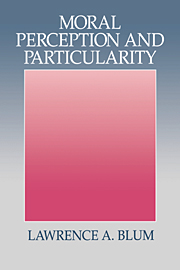Book contents
- Frontmatter
- Contents
- Acknowledgments
- PART I PARTICULARITY
- PART II MORAL EXCELLENCE
- 4 Moral exemplars: reflections on Schindler, the Trocmés, and others
- 5 Vocation, friendship, and community: limitations of the personal-impersonal framework
- 6 Altruism and the moral value of rescue: resisting persecution, racism, and genocide
- 7 Virtue and community
- PART III THE MORALITY OF CARE
- Index
4 - Moral exemplars: reflections on Schindler, the Trocmés, and others
Published online by Cambridge University Press: 12 January 2010
- Frontmatter
- Contents
- Acknowledgments
- PART I PARTICULARITY
- PART II MORAL EXCELLENCE
- 4 Moral exemplars: reflections on Schindler, the Trocmés, and others
- 5 Vocation, friendship, and community: limitations of the personal-impersonal framework
- 6 Altruism and the moral value of rescue: resisting persecution, racism, and genocide
- 7 Virtue and community
- PART III THE MORALITY OF CARE
- Index
Summary
In The Sovereignty of Good Iris Murdoch berated Anglo-American philosophers for failing to describe a moral ideal which is of unquestionable excellence and which has the power to inspire us to be better than we are. Murdoch assumed that such a task would involve a fuller moral psychology than the resources of philosophy had at that time been able to provide.
Although the beginnings of such a moral psychology have begun to show themselves in work done within virtue theory, at the same time there has been an attack on moral excellence itself, an attack which has had two sources. The first questions the traditional view that moral considerations – generally associated with an impersonal, impartial, and universal point of view–take automatic precedence over any other action-guiding considerations. Thomas Nagel and, more radically, Bernard Williams argue that considerations of personal satisfaction or self-realization should in some circumstances be allowed to outweigh moral considerations (as defined by an impersonal point of view), while Philippa Foot argues more generally that moral considerations do not always override nonmoral ones.
This attack on the priority of the moral has spawned a second, more direct, attack on moral excellence itself, that is, on the supreme value of a morally excellent life. A weaker form of this attack has it that since many human goods – for example, aesthetic, scientific, athletic – lie outside morality, lives devoted to morality exemplify only one of the many types of human good, and one which cannot be given a general priority over all others.
- Type
- Chapter
- Information
- Moral Perception and Particularity , pp. 65 - 97Publisher: Cambridge University PressPrint publication year: 1994



